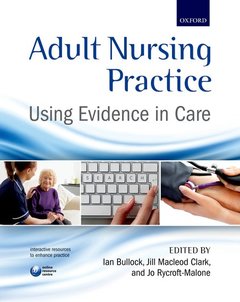Description
Adult Nursing Practice
Using evidence in care
Coordinators: Bullock Ian, Macleod Clark Jill, Rycroft-Malone Joanne
Language: English
Publication date: 05-2012
560 p. · 19.7x26.4 cm · Paperback
560 p. · 19.7x26.4 cm · Paperback
Description
/li>Contents
/li>Biography
/li>
Adult Nursing Practice: Using evidence in care enables today's students and newly qualified nurses develop the knowledge and skills they need to deliver, and lead care tomorrow. Reflecting the principles of evidence-based care in line with the current NMC competencies, this textbook helps students learn to manage patients with common conditions and fundamental health needs so they can provide the best possible evidence-based care. Written, and edited by leading nurses from practice, education and research, it focuses on common diseases, fundamental health needs, and symptoms that nurses' encounter in daily practice. Conditions are clearly explained so that the causes of ill health are easily understood. Every chapter covers pathophysiology, indicates the key priorities for nursing assessment, and discusses 'what the evidence says', before considering nursing management options. Throughout the authors' clear signposts to trustworthy evidence mean that students can effortlessly select the best nursing interventions for their patients using the current available evidence-base. The ideal guide for students preparing for registration and newly qualified staff going through preceptorship, it is packed with over 115 illustrations and lots of features to bring the subject to life and make learning easier: BLNursing assessment illustrations outline challenges caused by common diseases in a helpful and memorable way, highlighting issues that need assessment BLRed flag icons indicate the warning signs of deterioration and urgent questions are listed that can be used for assessment and monitoring BLCase studies of effective evidence-based interventions show the difference that high quality nursing care makes BLCross references between common conditions' causes and managing related health needs and symptoms develop understanding by clearly linking pathophysiology with nursing management options BLTheory into practice boxes further enhance learning through suggested activities, such as exploring key evidence, considering major practice issues or applying core knowledge while out on placement BLOnline resource centre at www.oxfordtextbooks.co.uk/orc/bullock /. Filled with interactive and useful e-learning resources to help students test their learning, keep up-to-date with the latest evidence and further expand their knowledge, it features: BLClinical decision making scenarios BLQuiz questions BLUpdates to content BLHyperlinked references BLimages from the book BLLecturer resources
1. Introduction: Reframing Adult Nursing. Part 1:Understanding core conditions. 2. Understanding Asthma. 3. Understanding Bone conditions. 4. Understanding Cancers. 5. Understanding Chronic Obstructive Pulmonary Disorder. 6. Understanding Coronary heart disease. 7. Understanding Dementia. 8. Understanding Depression. 9. Understanding Diabetes. 10. Understanding Functional bowel disorders. 11. Understanding Renal disorders. 12. Understanding Skin conditions. 13. Understanding Stroke. Part 2: Managing health needs and symptoms. 14. Managing anxiety and agitation. 15. Managing breathlessness. 16. Managing continence and elimination. 17. Managing delirium and individuals presenting with. 18. Managing end of life care. 19. Managing hydration. 20. Managing hygiene. 21. Managing the prevention of infection. 22. Managing medications. 23. Managing mobility. 24. Managing nutrition. 25. Managing pain. 26. Managing perioperative care. 27. Managing skin care and preventing skin breakdown. 28. Managing wounds.
Dr Ian Bullock is Chief Operating Officer at the National Clinical Guideline Centre, Royal College of Physicians where he has developed expertise in evidence based healthcare and research and development (including quality improvement). He is responsible for a large funded research programme on behalf of NICE, with particular focus on the development of National Clinical Guidelines and Quality Standards. Professor Jill Macleod Clarke is Professor of Nursing, Faculty of Health Sciences at the University of Southampton and has many years experience as a clinical nurse, educator and researcher. She has an international reputation for her research into health promotion, communication and interprofessional learning. She has held a number of academic leadership positions where she championed the move to all graduate nursing profession. Jill has acted as Chair of the UK Council of Deans of Health and as a member of the 2008 Research Assessment Panel for Nursing and Midwifery. Professor Joanne Rycroft Malone is Professor of Implementation Research and Director of Research at Bangor University. She has an international reputation for research that aims to improve service delivery and patient care through the appropriate use of evidence in practice. She is currently a principal and co-investigator of research grants that explore various aspects of knowledge use in practice, including evaluating different implementation interventions. Jo is also the inaugural editor of the journal Worldview on Evidence-Based Nursing.
© 2024 LAVOISIER S.A.S.




